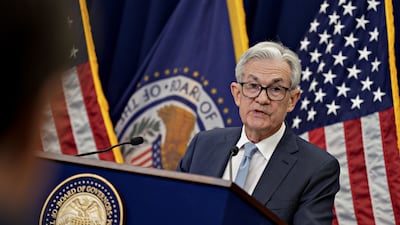The US Federal Reserve on Wednesday raised its interest rates by 50 basis points in its continued efforts to fight inflation and indicated more are to come next year.
Wednesday's announcement does make good on indications the central bank would reduce the scale of its interest rate increases. But inflation is still at 7.1 per cent, well above the Fed's long-term goal of 2 per cent.
Fed Chairman Jerome Powell said the central bank would continue to raise rates next year. Monetary policy will need to be restrictive “for some time”, he added.
The median projected level of federal funds for the end of next year is 5.1 per cent, before dropping to 4.1 per cent in 2024. Mr Powell said the bank has forecasted rates to be reduced to 3.1 per cent by 2025.
“The [Federal Open Market] Committee expects that continued increases in the target range will be appropriate to attain a monetary policy stance that is sufficiently restrictive to return inflation to 2 per cent over time,” he told reporters during a news conference.
“We've covered a lot of ground and the full effects of our rapid tightening so far are yet to the felt.”
The S&P 500, Nasdaq Composite and Dow Jones Industrial Average slightly recovered during Mr Powell's remarks after tumbling following the Fed's announcement.
This is the seventh interest rate rise that the Fed has issued this year after rates were at near zero per cent in March. The latest announcement raises interest rates to the range of 4.25 and 4.50 per cent, the highest level in 15 years.
“Of course, 50 basis points is still a historically large increase, and we still have some ways to go,” Mr Powell said.
The Fed announced eye-watering raises after Mr Powell incorrectly predicted last year that the high level of inflation was “transitory”.
The six interest rate increases that the Fed has imposed this year have made borrowing costs higher for things such as credit cards and mortgages.
The Fed has seen some positive signs in recent weeks, however.
The US consumer price index, a day before the Fed's interest rate announcement, showed that inflation had eased to 7.1 per cent year-on-year, down from a summer peak of 9.1 per cent.
“It will take substantially more evidence to give confidence that inflation is going to sustain a downwards path,” Mr Powell said.
The resilience of the US labour market and wage growth continue to stymie the Fed's efforts to combat inflation — exacerbated even more by Russia's war in Ukraine.
The question in 2023 will be whether the Fed has been too aggressive with its interest rate increases. Mr Powell and his colleagues have sought to tamp down on inflation without driving the US into a recession.
With the holiday season in full-swing, Americans are beginning to feel the pain of everyday cost increases.
In addition to facing higher-than-usual costs on petrol, groceries and electricity, US consumers are also having difficulty purchasing gifts, an AP-NORC poll found. And of those people who are buying presents, 91 per cent are cutting back on their gift-giving.
Mr Powell said the Fed is “acutely aware” of the economic hardships facing Americans, in particular those on lower incomes.


